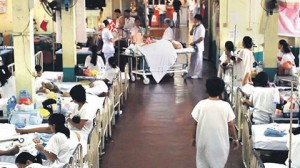MANILA, Philippines – The establishment of more public health facilities, not the Reproductive Health law, will help address the health needs of women and children, according to an official of the Episcopal Commission on Family and Life of the Catholic Bishops’ Conference of the Philippines.
“What the mothers and their children need are more public health centers addressing their total health needs, not just their so-called reproductive health needs,” Fr. Melvin Castro, the commission’s executive secretary , said in an interview.
Castro was reacting to a statement by the Department of Health that the RH law could help prevent or minimize abortions because it would enable couples to plan their families.
Health Secretary Enrique Ona had expressed alarm over the increasing number of hospital admissions due to abortions—both induced and spontaneous or miscarriages. He said abortion was one of the top three obstetrics-gynecology cases in at least nine DOH hospitals in 2012 and 2013.
Castro said the government, instead of giving away contraceptives, should provide women with ample supplies of medicine and vitamins.
The Catholic Church is opposed to the RH law, saying it is anti-life and anti-family because it promotes artificial means of contraceptives, among other things. The Church is for natural family planning only.
Castro said the DOH report was contrary to the claim of RH law proponents on the number of abortions in the country.
According to him, proponents of the RH Law have been insisting that there are half a million abortions in the country every year, and that these abortions cause 13 maternal deaths every day.
“They even said mothers are turned away by the hospitals. But now that the DOH has given the official figures showing that they do get treated and there are not half a million abortions each year, the more we appeal to the Supreme Court magistrates to declare the RH Law unconstitutional,” Castro added.
He said the RH Law was passed on the bnasis of “false premises, inaccurate data, and even bribery by way of pork development assistance fund or PDAF.”
The Supreme Court has yet to issue a final ruling on a petition seeking to have the RH law stricken down as unconstitutional.
RELATED STORIES
Church still firm vs RH law but wants no enemies because of it
SC asked to declare RH law unconstitutional
